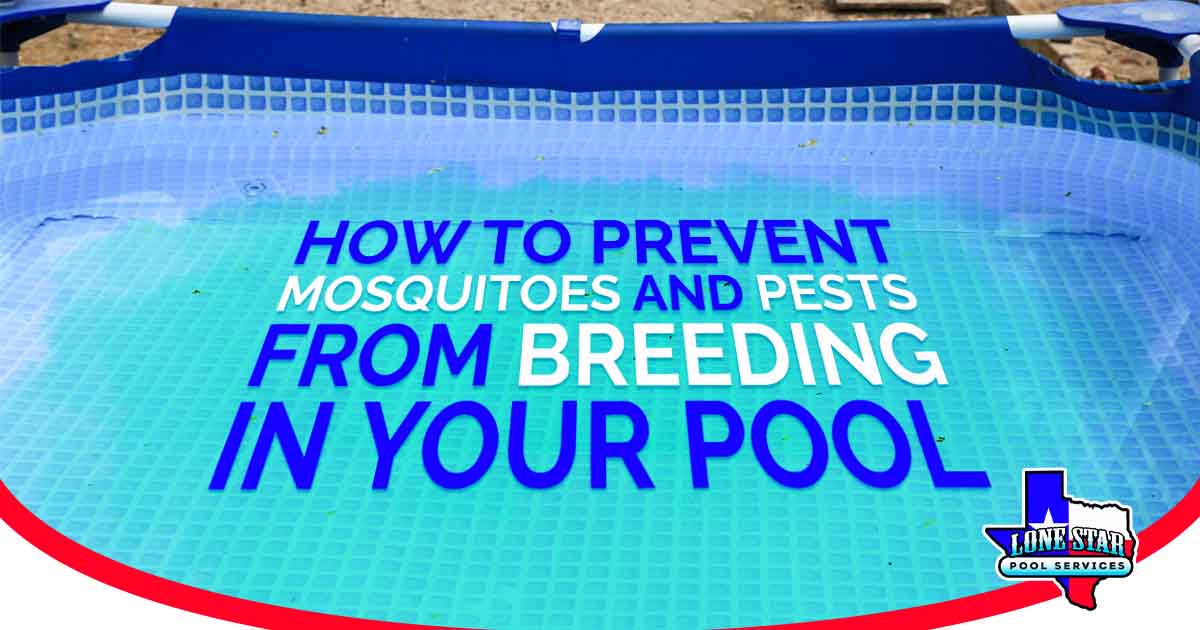Mosquitoes and other pests are more than a seasonal nuisance-they can become a serious concern for pool owners if not appropriately managed. Pools with stagnant or untreated water can become breeding grounds for insects that pose health risks and compromise pool hygiene. Homeowners in warmer climates, especially in areas like Texas, must proactively prevent pests in swimming pools. This page outlines how mosquitoes end up in pools, the role of proper filtration and pool covers, and why hiring a pool service professional like Lone Star Pool Services is essential to year-round pest prevention.
Understanding the Risk of Mosquitoes in Pool Water
Why Mosquitoes Are Attracted to Pools
Mosquitoes are naturally drawn to standing water. Pools that are not adequately maintained—such as those with poor circulation, clogged filters, or lack of regular cleaning—can accumulate stagnant water, which creates an ideal environment for mosquitoes to lay eggs. Once eggs hatch, mosquito larvae can thrive in still water until they mature into adult mosquitoes.
In addition to mosquitoes, other pests, such as water beetles and midges, may also begin to breed in untreated pools. Left unchecked, these pests can multiply quickly, turning a recreational space into a health hazard.
Health and Safety Concerns Related to Mosquitoes in Pools
Mosquitoes are known carriers of viruses such as West Nile, Zika, and dengue fever. Though this page does not provide medical advice, it’s widely understood that minimizing mosquito exposure is a public health priority. Pools that allow mosquito breeding may increase the risk of mosquito-borne diseases in residential areas.
Further, insect activity can discourage pool usage and impact the overall value of maintaining a backyard swimming area. A pest-infested pool also increases maintenance costs as the water chemistry becomes more complicated, and equipment may suffer from biological contamination.
Disclaimer: The information on this page is for general informational purposes only. It is not a substitute for professional advice. Homeowners concerned about pest-related health risks should consult a licensed pest control provider or healthcare professional.
Effective Filtration Habits to Reduce Mosquitoes in Pools
Importance of Proper Pool Filtration Systems
Consistent and efficient filtration is one of the most effective ways to prevent mosquitoes in pool water. Mosquitoes require stagnant water to lay eggs and complete their breeding cycle. A properly functioning filtration system keeps water moving, which disrupts mosquito activity and reduces the chance of larvae survival.
Strong filtration deters mosquitoes and helps prevent pests in swimming pools by minimizing organic material, such as leaves and algae, which can attract other insects and pests. A well-maintained system supports water circulation and ensures that pool chemicals are evenly distributed, making the environment less hospitable to unwanted bugs.
For most residential pools, it is recommended that the filtration system be run 8 to 12 hours per day, especially during warmer months. This circulation level helps eliminate stagnant zones where mosquitoes and insects might attempt to settle.
Maintaining Your Filtration System for Pest Control
Even the best filtration system can become ineffective if not properly maintained. Dirty filters, clogged pumps, and unbalanced water chemistry can lead to low circulation and increase the risk of standing water forming in corners or near pool steps. If not addressed, these overlooked areas may become mosquito breeding grounds.
Routine maintenance includes:
- Cleaning skimmer baskets
- Backwashing the filter when needed
- Inspecting pumps and filters for debris or buildup
- Monitoring for low-pressure or flow issues
Additionally, water levels should be kept within recommended ranges to ensure effective skimming. Overflowing or underfilled pools may cause areas of stagnation, attracting mosquitoes and other pests.
Professional pool maintenance services, such as those offered by Lone Star Pool Services, can help identify potential filtration issues before they contribute to pest problems. Routine inspections ensure equipment runs efficiently and the pool remains free of conditions that invite mosquitoes and pests.
Disclaimer: The guidance is for general pool care and pest prevention. For equipment repairs or pest control treatments, homeowners should consult certified professionals.
The Role of Pool Covers in Preventing Pest Infestations
Types of Pool Covers That Help Prevent Mosquitoes and Other Pests
Using a pool cover is another practical and effective method of preventing mosquitoes in pool areas. It reduces exposure to debris, limits water evaporation, and, most importantly, blocks mosquitoes from accessing the water’s surface.
There are several types of pool covers that help reduce pest activity:
- Solid pool covers: These completely seal the water surface, leaving no gaps where mosquitoes can enter. They are ideal for long-term or seasonal use.
- Mesh covers: These allow water to pass through but block larger debris. At the same time, mesh covers are not fully mosquito-proof but can reduce other forms of organic matter that attract pests.
- Automatic pool covers offer convenience with easy deployment and retraction, encouraging regular use. Automatic systems are effective for daily protection when the pool is unused.
Choosing the correct type of cover depends on how frequently the pool is used and the level of pest prevention required. Solid or automatic covers are typically the most effective for full protection against mosquitoes in pool environments.
Best Practices for Using Pool Covers to Stop Mosquito Breeding
Improper use or storage of pool covers can contribute to mosquito problems. Water accumulating on top of a cover—especially in dips or folds—can become a new breeding ground if not drained regularly.
To prevent pests in swimming pools using covers, homeowners should:
- Keep the cover tightly sealed when not using the pool
- Remove standing water from the cover after rainfall or irrigation.
- Clean the cover regularly to avoid algae or debris buildup.
- Store the cover in a dry area when not in use for extended periods.
Using a cover consistently, particularly during non-swim times, dramatically reduces the opportunity for mosquitoes to access the water. Covers also keep leaves and insects out of the pool, reducing the organic material that attracts pests.
Routine inspections by pool service professionals—like those at Lone Star Pool Services—can help verify that covers are functioning properly and free of water buildup or structural issues.
Disclaimer: This information provides general guidance on pool cover use and pest prevention. For advice on selecting or installing specific products, homeowners should contact a licensed pool professional or manufacturer.
Additional Methods to Prevent Pests in Swimming Pools
Removing Standing Water Around the Pool Area
Preventing mosquitoes in a pool requires more than maintaining the water itself—it also involves managing the area surrounding the pool. Mosquitoes don’t need large bodies of water to breed; even small puddles or containers can provide a suitable environment for laying eggs.
Familiar sources of standing water around pools include:
- Overflowing planters or pots
- Clogged gutters and downspouts
- Unused buckets, toys, or equipment left outside
- Poolside furniture or covers that trap rainwater.
To effectively prevent pests in swimming pools, homeowners should routinely inspect the yard and patio area for water accumulation. Draining or removing items that collect water is a simple but critical step in mosquito control. Landscaping can also be designed to direct runoff away from the pool deck and prevent water pooling near the structure.
Keeping the area clean and dry discourages mosquitoes and reduces the presence of ants, spiders, and other pests that may gather near the water’s edge.
Use of Safe Pest Control Products and Natural Remedies
Some homeowners choose to use pest control products safe for pool environments for additional protection. However, not all chemicals are suitable for use near or in pool water, so caution is essential.
Standard pest control methods include:
- Mosquito dunks or larvicides: When used according to label instructions, these can be placed in standing water outside the pool area and are designed to kill mosquito larvae without harming humans or pets.
- Biological controls: Introducing particular fish species (such as mosquito fish) in decorative water features—not swimming pools—may help control larvae populations.
- Essential oils or natural repellents: Oils such as citronella or eucalyptus may be used around pool areas as deterrents, though their effectiveness can vary.
Homeowners should always ensure any product used does not interfere with pool water chemistry or filtration. Lone Star Pool Services can guide pool-safe pest deterrent practices that align with local environmental and safety standards for those unsure about safe options.
Disclaimer: Product suggestions are provided for informational purposes only. Before using any pest control substance, consult a licensed pest control professional and review manufacturer guidelines. Lone Star Pool Services does not endorse or apply chemical treatments for pest control and assumes no responsibility for third-party product use.
Why Hiring Lone Star Pool Services Helps Prevent Mosquitoes in Your Pool
Professional Pool Maintenance Reduces Risk of Infestation
Even with the best intentions, many homeowners struggle to maintain consistent pool care, especially when it comes to pest prevention. Skipped cleanings, infrequent filter checks, and seasonal lapses in cover use can all lead to conditions that attract mosquitoes and other pests. That’s where professional service becomes essential.
Lone Star Pool Services offers expert maintenance programs to prevent swimming pool pests by addressing the most common breeding conditions. These include:
- Ensuring optimal filtration and water circulation
- Removing debris that attracts insects
- Verifying chemical balance to reduce organic growth
- Inspecting covers and drainage for signs of stagnation
Their technicians understand how mosquitoes and pests operate in warm climates like Texas, and they take a proactive approach beyond just pool cleaning. Each service visit is tailored to keep the pool environment clean, circulating, and pest-resistant.
Benefits of Consistent Service from Lone Star
By scheduling regular service with Lone Star Pool Services, pool owners gain more than a clean pool—they get a preventive pest management partner. Benefits include:
- Reduced mosquito presence and breeding potential
- Lower risk of waterborne contaminants
- Fewer equipment breakdowns related to pest or algae buildup
- More time enjoying the pool, less time maintaining it
In addition, Lone Star offers seasonal inspections to prepare pools for warmer months when mosquito activity peaks. These pre-season tune-ups help address potential risk areas before pest problems begin.
Hiring professionals also reduces the need for DIY pest treatments, which can be costly or damaging if misused. Lone Star’s service team focuses on prevention-first solutions, ensuring that pools remain safe and inviting for families throughout the year.
Disclaimer: While Lone Star Pool Services helps reduce conditions that attract pests, it does not provide licensed pest control services. To treat active infestations, homeowners should contact a certified pest control provider.
Get Professional Help to Prevent Mosquitoes in Your Pool
Don’t let mosquitoes and unwanted pests take over your pool. Lone Star Pool Services offers reliable, professional pool maintenance to help prevent mosquitoes and keep your water clean, circulating, and pest-free.
Whether optimizing your filtration system, maintaining your pool cover, or scheduling regular cleaning visits, Lone Star provides homeowners with the services to enjoy their pool without worry.
Call Lone Star Pool Services today at (832) 928-3017 to schedule a consultation or learn about seasonal service packages designed to protect your pool from pests year-round.
Disclaimer: This content is for general information only and is not intended to replace professional advice. Lone Star Pool Services does not provide pest control services and assumes no liability for third-party pest-related solutions. Always consult licensed professionals for pest management or chemical use.

